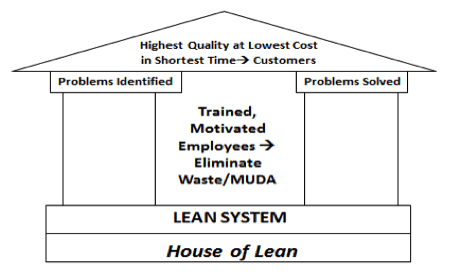ONLINE EXCLUSIVE: What Is the Value of Lean?
By Mark Doman
 |
| Mark Doman offers insights from his blog "Doman on Lean." |
Lean is a system, just like mass production is a system. We are used to the mass production system. It seems normal to most of us who started working and running businesses in the 20th century.
Mass production focuses on machines and output. Lean, on the other hand, focuses on people and processes.
While there are many definitions of lean, the definition that I think best captures the fundamental differences and value of lean is: Lean is a system that creates a physical and social environment where problems are quickly identified and then solved by motivated employees who are trained to eliminate waste in their processes so that customers receive the highest quality products and/or services at the lowest cost in the shortest lead time.
I use my adaptation of the House of Lean below to exemplify the definition in one diagram:

Lean is a holistic approach to business operations. It is a different (in some cases very different) way of thinking, problem-solving, producing products and managing organizations. That is why it is so difficult to implement. It is not just one change, but a continuous series of changes that amounts to a fundamentally different way of running a business.
The Lean System strives to makes problems highly visible to trained employees who are motivated to eliminate waste/muda in their processes and to solve these problems right away.
Think about how different that is from how our businesses are run today. Think about all the ways we avoid or work around the problems in our processes. Picture the excess production we make and tuck away just in case a machine breaks down or there is a problem “up the line.” Walk to the back of the plant or into the warehouse and look at all the finished goods inventory stored for those problem orders and last-minute customer demands because our changeover process takes too long. Count all the people on your payroll whose job it is to check on others and fix their mistakes, rather than ensuring first-run process capability.
This is all waste/muda! And there is a big cost associated with it.
Waste/muda is any motion or activity that does not add value for the customer. Remember, customers won’t willingly pay for the waste/muda in your processes. Elimination of waste/muda can significantly reduce costs and create a true competitive advantage — for you or your competitors. It’s up to you.
Lean teaches us to focus on the true value-add of what we do. Work is any motion that adds value to the product or service and that the customer is willing to pay you for, and, as Taiichi Ohno said, “True cost (value-added work) is the size of a plum pit.”
Depending on the type of business you are in, you may have more of some types of waste than other types. But there is a lot of waste/muda. More than you think! It may come in the form of extra processing, delay/waiting and conveyance or as mentioned above, excess production, inventory and fixing defects.
You must “go to the gemba” to “see” waste/muda in your processes. You can’t see it from your office, and that’s why the employees who do the work are best positioned to see the waste/muda and eliminate it. That’s why employees are the key to a successful lean transformation. Lean doesn’t even begin to work without trained people motivated to find and fix problems.
Now reflect about your frontline employees (not your supervisors and engineers) and mentally count how many of them feel it is their job to identify problems and fix them without being told to do so. How many of them are trained to jump in to problem-solve a situation and work together to implement a solution? My guess is that most of them are “trained” to look the other way and let the problem roll down the line to become someone else’s problem or let the boss take care of it.
Just think how powerful it could be if each of your employees were trained and motivated to assume personal responsibility for the ultimate quality, cost and delivery of the product for your customers. That is the value of lean.
Mark S. Doman is a Pawley Professor in Lean Studies at Oakland University in the Human Resource Development Department and a member of the leadership team at the Pawley Lean Institute. Prior to joining Oakland University, he had 25 years of business experience with Ford and AT&T, where he held various executive positions in operations, human resources and legal. He has led several major organizational change initiatives throughout his career that included Lean Workouts, quality circles, TQM, process re-engineering, kaizens and corporate restructuring. He is the author of “A New Lean Paradigm in Higher Education: A Case Study.” Quality Assurance in Education, Vol. 19 No. 3, 2011 and “How Lean Ready Are You?” Target, Vol. 28 No. 2, 2012. His email address is doman@oakland.edu.


